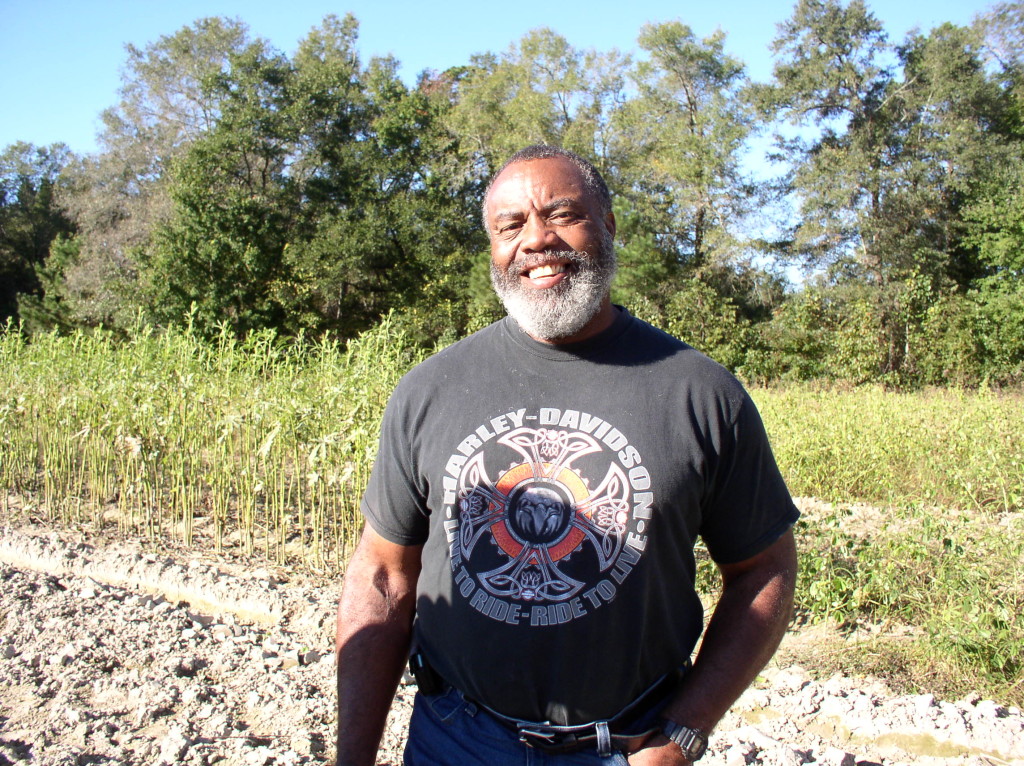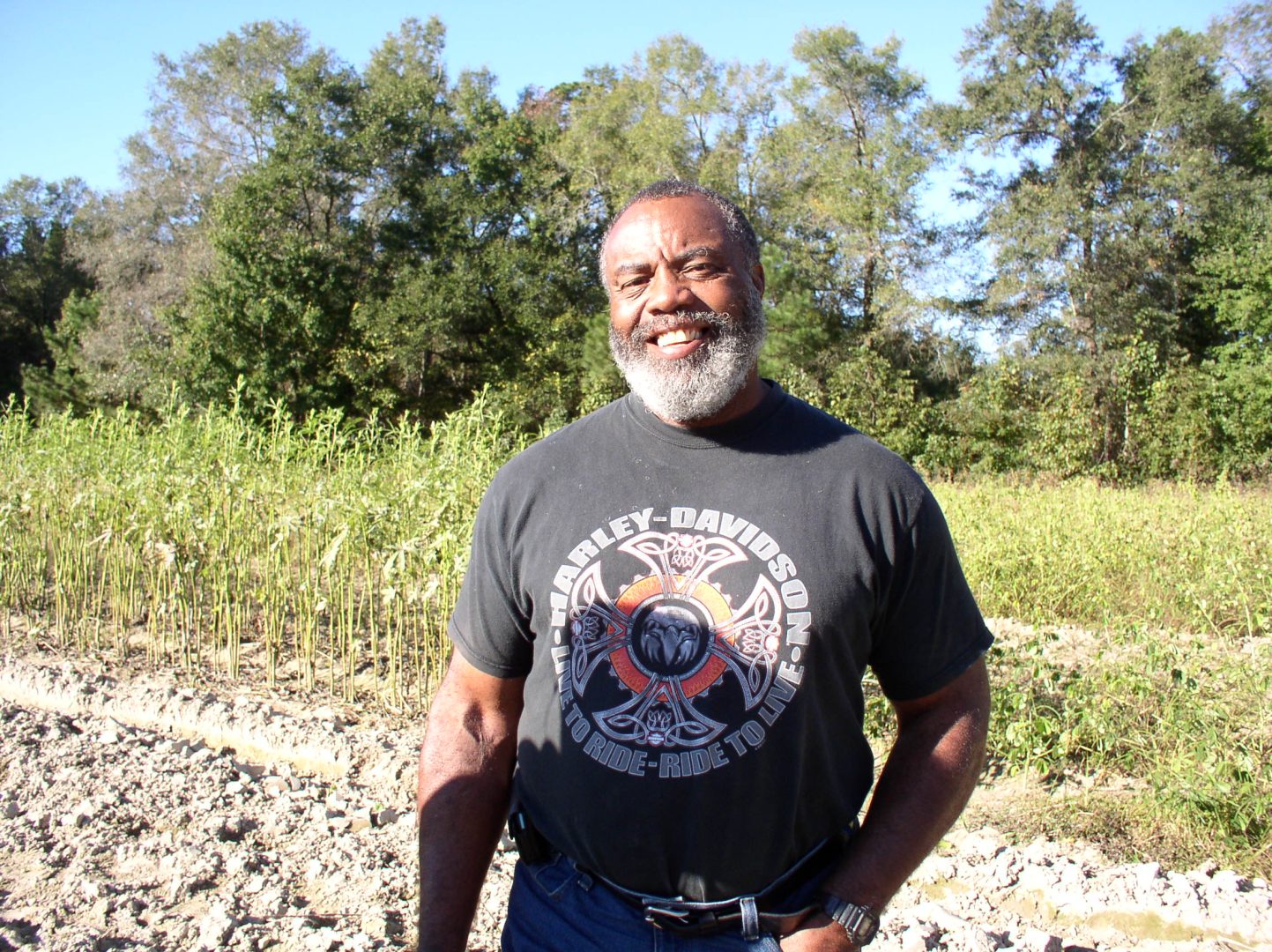by Amy Armbruster, Communications Coordinator
 Allen Cockfield grew up on the same farm as his grandfather and mother, but when he left Coward, SC, he had no intention of coming back. He spent 31 years as a police officer in Florida. However, his sisters did not have the same financial security that a pension provided Allen, and he had promised his mother that he would keep the family together.
Allen Cockfield grew up on the same farm as his grandfather and mother, but when he left Coward, SC, he had no intention of coming back. He spent 31 years as a police officer in Florida. However, his sisters did not have the same financial security that a pension provided Allen, and he had promised his mother that he would keep the family together.
He saw an opportunity to do that with the family farm. He invested “way too much” and began work on J&C Cockfield Farms – named for his parents, James and Cecile.
Allen followed the footsteps of his grandparents, but he is also a trailblazer. He talked to me from the cab of his old John Deere tractor while planting non-GMO soybeans. Allen is a big guy with broad shoulders and a deep, commanding voice; you can tell he was a cop. When you get him started on healthy food and soil, you might not guess that farming is his second career. He has big plans for this land.
“I told them, I’d only do it if it was organic,” he begins. But the farm had worn-out soil. “When I inherited this family farm, there wasn’t a bee flying around anywhere,” he added. To transition into organic crops, Allen sought help.
His first stop was the local Natural Resource Conservation Service (NRCS) office. The NRCS gives out funds for Conservation Activity Plans (CAP138). CAP 138s are invaluable to farmers interested in transitioning from conventional to certified organic production. Completed with a technical service provider, CAPs document practices that address site-specific natural resource needs like those that were a problem on Allen’s farm: erosion, run-off, poor soil quality, and pest problems.
The CAP tells you how to address identified needs and opens the door to additional cost-share assistance to implement conservation practices. If that wasn’t a good enough deal, it also forms the basis of your Organic System Plan – the core document you need to become certified organic.
A Helping Hand from CFSA
The NRCS connected Allen with CFSA’s Keith Baldwin, a technical service provider, and organics expert. Keith worked with Allen to create a CAP for his farm that included an 8-year cover crop and vegetable rotation, plus a nutrient management plan.
“What Keith did for me was very helpful,” Allen said. “He talks with you at a level you can understand. He doesn’t overwhelm you with his knowledge, but he is very knowledgeable.”
In J&C Cockfield Farms’ plan, Keith identified several resource concerns, including practices that could result in soil erosion and organic matter depletion, lack of irrigation for crops, potential off-farm nutrient movement, sub-optimal productivity, and potential pest problems – all ghosts of the farm’s conventional history.
He recommended a comprehensive rotation, a water well and drip irrigation system, cover crops for nitrogen fertility, conservation cover for beneficial insect and pollinator habitat, mulching, a high tunnel, and a rotational grazing pasture.
Armed with this guidance, J&C Cockfield Farms plans to certify almost 30 acres and grow sweet corn, cucumber, Irish potatoes, peppers, watermelon, leafy greens, okra, lettuce, and tomato, plus grain corn, wheat, canola, and sweet potatoes. Allen was also interested in growing lavender, ginger, tomatoes, and baby greens in high tunnels, so Keith investigated these crops’ nutrient needs for him, too.
“The CAP plan enhanced my knowledge and ability to plan what I’m going to do next in this field. Because of the soil, you just can’t plant corn in the same place year after year. It will wear out the soil. Planting corn drains nitrogen, so the next year, you need to plant something in that field that will replenish the nitrogen. The plan tells me how to do that,” Allen said.
Healthy Soil Produces Healthy Plants
“One of the biggest mistakes you see in farms transitioning to organic is that farmers don’t apply enough nutrients to the soil. The Nutrient Management Plan for Allen’s farm spells out in detail exactly how to get that nutrient mix right for each type of vegetable, specially formulated to his soil type,” clarified Keith.
In Allen’s words, “I can see that [the CAP] is going to be instrumental to my farm’s profitability because my soils will be healthy. Healthy soil produces healthy plants.”
After completing a CAP-138, producers can apply for cost-share assistance to implement conservation practices identified in the plan. “Since the beginning of the EQIP-Organic Initiative in 2009, nearly $900,000 has been allocated to farmers in SC,” according to NRCS Soil Agronomist, Gordon Mikell.
The NRCS provides assistance to implement practices like “establishing buffers, installing pollinator habitat, establishing cover crops, and improving irrigation efficiency by converting to micro-irrigation. Financial assistance to purchase high tunnels or hoop houses are also an available for organic producers who want to extend their growing season, improve soil organic matter and improve plant quality,” added Mikell.
Allen took advantage of this opportunity and is one step closer to building a profitable organic farm. The NRCS awarded financial assistance to implement the cover crop plan in his CAP 138 and to buy a high-tunnel.
As an added benefit, Allen can also apply for organic certification using the strategies Keith recommended. “Much of the CAP 138 can be used in your Organic Transition Plan,” Keith said.
Allen confirms that the plan will make certification easier for him, “It shows that I have a plan in place to deal with pests, to encourage beneficial bugs like bees and wasps, to help build my soil, and what would be best to grow in the soils I have – organically.”
With only 27 certified organic farms in SC and consumer demand on the rise, certification will allow Allen to take advantage of great price and market opportunities, especially in wholesale markets.
Allen’s vision? “Growing healthy for healthier people.” He hopes to have trucks displaying this slogan and the J&C Cockfield Farms logo and delivering healthy, organic produce all over the Pee-Dee region.
“I don’t want to be part of the problem. I want to be part of the solution,” said Allen. “If I can grow organic, non-genetically modified plants, that’s what I’m going to do.”
Apply for a Conservation Planning
Take advantage of CFSA’s technical assistance and receive a rebate for completing a CAP-138.
Editor’s Note: In 2022, NRCS rebranded their conservation activity plans. CAP-138s are now known as CPA-138s. Conservation Activity Plans is now referred to as Conservation Planning.


